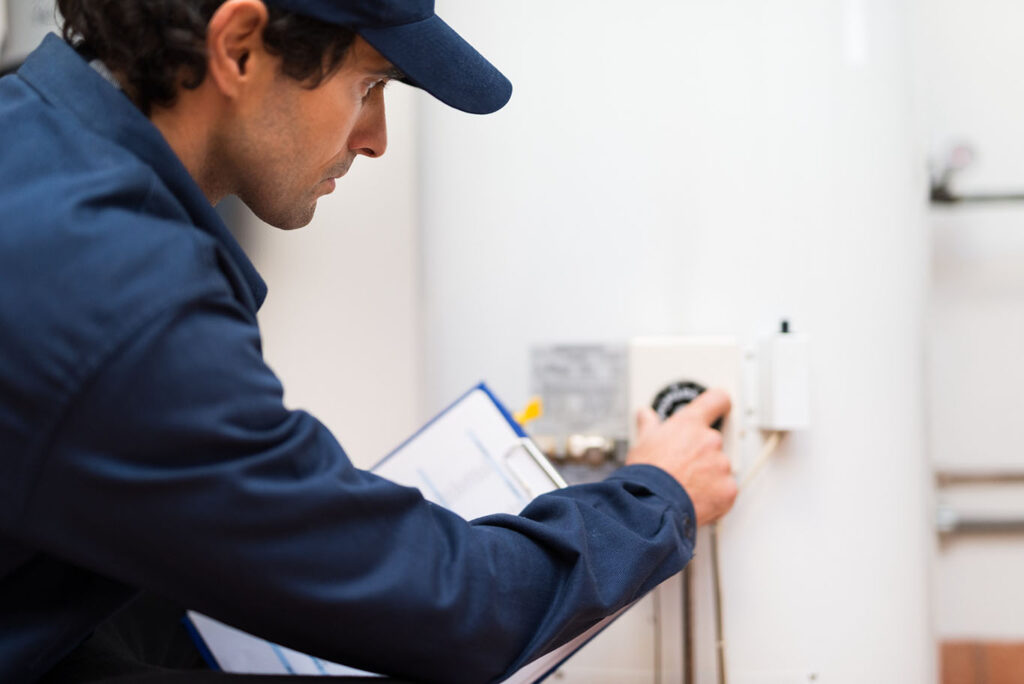
Picture this: you’re going about your day in your cozy Massachusetts home, enjoying a hot shower or washing dishes when suddenly, you notice a puddle forming around your water heater.
Panic sets in – is your house flooding!?
Don’t worry, you’re not alone in facing this conundrum. Leaks from a water heater’s drain valve are more common than you might think!
In this comprehensive guide, our Bellingham and Franklin water heater service pros dive into the reasons behind this issue and provide you with expert advice to address it. And who better to turn to than the reliable plumbing experts at G&C Plumbing & Heating?
Understanding the Drain Valve: A Culprit in Disguise
The drain valve of your water heater is a small yet crucial component. Located near the base of the tank, it serves the purpose of periodically flushing out sediment and minerals that accumulate at the bottom. Over time, this sediment can lead to reduced efficiency and potential damage to the tank.
However, when the drain valve itself starts leaking, it’s time to take action.
Common Causes of Drain Valve Leaks
- Loose or Faulty Valve: One of the most straightforward reasons for a leak is a loose or defective valve. This can happen due to wear and tear over the years, causing water to escape from the valve connection.
- Sediment Buildup: Ironically, the very sediment that the valve is meant to flush out can also contribute to leaks. Excessive sediment accumulation can cause the valve to become clogged or corroded, resulting in leakage.
- Excessive Pressure: High water pressure is another potential cause of leaks. If the pressure inside the tank becomes too much for the valve to handle, it might start leaking to release the excess pressure.
Addressing the Issue: Tips and Solutions
If you notice water leaking from your water heater’s drain valve, don’t panic—many times, the problem can be addressed with a few straightforward steps. Here are the most common solutions:
- Tightening the valve: Sometimes, a loose valve is the simplest cause of the leak. Use a wrench to gently tighten the drain valve, being careful not to overtighten and damage the fitting.
- Flushing the tank: Sediment buildup inside the tank can prevent the valve from sealing properly. Flushing your water heater at least once a year helps clear out mineral deposits and may stop minor leaks at the drain valve.
- Replacing the valve: If tightening or flushing doesn’t fix the problem, the valve itself may be worn out. Replacing the drain valve is often the most effective long-term solution—but this is best handled by a licensed plumber to ensure it’s installed correctly and safely.
While these steps can sometimes resolve the issue, it’s important to remember that leaks may also be a sign of bigger problems, such as internal tank damage. That’s why professional evaluation is key.
If your water heater drain valve continues to leak, or if you’re unsure about tackling the repair yourself, call us for water heater repair in Franklin, MA. We’ll quickly diagnose the issue and get your system running reliably again.
FAQs About Water Heater Drain Valve Leaks
Keeping Your Water Heater in Top Shape
A leaking water heater drain valve might seem like a small problem, but it can quickly escalate if left unaddressed. By understanding the common causes and taking preventative steps like regular maintenance, you can avoid costly damage and extend the life of your water heater.
When the issue goes beyond a DIY fix, it’s best to call in a professional. That’s where G&C Plumbing & Heating comes in. Our experienced team has been helping Massachusetts homeowners with dependable Franklin and Bellingham water heater repairs and replacements for years.
Don’t wait for a small leak to turn into a major problem—schedule your water heater service with G&C Plumbing & Heating today!
Call (508) 966-8919













